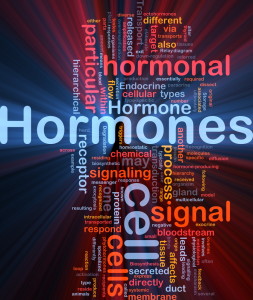Hormones are important cell signals that the body uses to get certain effects in target organs far removed from the hormone glands where the hormones are produced.
The following are headings of chapters that deal with details about the various hormone subtopics and that are linked to this page.
Hormonal Navigation
General hormone actions: Hormone Introduction , Cyclic AMP , Some hormones and their actions , Syndrome of insulin resistance.
Pituitary disorders: Introduction , Anterior lobe pituitary disorders , Effect of pituitary hormones , Pituitary apoplexy(pituitary gland stroke) , Posterior pituitary disease , Sheehan syndrome ,
Thyroid problems: Introduction , Hyperthyroidism (thyrotoxicosis) , Hypothyroidism (myxedema) , Subclinical hypothyroidism , Thyroiditis (Hashimoto’s)
Hormone deficiency of testicles and ovaries (hypogonadism): Introduction to hypogonadism , Diagnostic tests for sex hormone deficiency , Signs and symptoms of hypogonadism , Treatment of hypogonadism
Male and Female Menopause: Introduction/meno/andropause , Menopause change of life in women , Menopause Weight Gain , Andropause (=male menopause) , Antiaging Treatment with Bioidentical Hormones
Diabetes mellitus and insipidus: Diabetes mellitus (what’s normally known as “diabetes”) , Diabetes insipidus
Adrenal gland disorders: Adrenal gland disorders
Growth hormone (GH) problems: Introduction to GH , GH deficiency (= dwarfism) , GH surplus (= acromegaly)
Summary Regarding Hormones
Hormone abnormalities are common. In this chapter I have shown the complexity of some of these abnormalities. I also have described that with some attention to proper exercise and balanced nutrition many hormone deficiency syndromes can be prevented. However, as people age there will be a significant number who require supplementation with bio-identical hormones (particularly for steroid hormones by applying appropriate creams to the skin).
With obesity running as high as 35% in the general population many, if not all of these people have the syndrome of insulin resistance, which can be effectively treated by limiting the amount of calories, carbohydrates and starch that are consumed without hunger pains by following a zone type eating plan (Ref. 12). This would normalize the elevated insulin level, remove the block at the secondary hormone messenger level, cyclic AMP, and free the regular hormone receptors to work normally again. In this way the thyroid ( for energy), the adrenal glands (for coping with stress) and the sex hormones (for a normal sex life) are given a chance to function normally again. Other problems such as depression will likely also decrease or disappear.
References
1. B. Sears: “The age-free zone”. Regan Books, Harper Collins, 2000.
2. R.A. Vogel: Clin Cardiol 20(1997): 426-432.
3. The Merck Manual, 7th edition, by M. H. Beers et al., Whitehouse Station, N.J., 1999. Chapter 8: Thyroid disorders.
4. The Merck Manual, 7th edition, by M. H. Beers et al., Whitehouse Station, N.J., 1999. Chapter 7:Pituitary disorders.
5. J Levron et al.: Fertil Steril 2000 Nov;74(5):925-929.
6. AJ Patwardhan et. al.: Neurology 2000 Jun 27;54(12):2218-2223.
7. ME Flett et al.: Br J Surg 1999 Oct;86(10):1280-1283.
8. The Merck Manual, 7th edition, by M. H. Beers et al., Whitehouse Station, N.J., 1999. Chapter 261: Congenital anomalies.
9. AC Hackney : Curr Pharm Des 2001 Mar;7(4):261-273.
10. JA Tash et al. : Urology 2000 Oct 1;56(4):669.
11. D Prandstraller et al.: Pediatr Cardiol 1999 Mar-Apr;20(2):108-112.
12. B. Sears: “Zone perfect meals in minutes”. Regan Books, Harper Collins, 1997.
13. J Bain: Can Fam Physician 2001 Jan;47:91-97.
14. Ferri: Ferri’s Clinical Advisor: Instant Diagnosis and Treatment, 2004 ed., Copyright © 2004 Mosby, Inc.
15. Rakel: Conn’s Current Therapy 2004, 56th ed., Copyright © 2004 Elsevier
16. Kronenberg: Williams Textbook of Endocrinology, 11th ed., © 2008 Saunders, An Imprint of Elsevier
17. George Gillson, MD, PhD and Tracy Marsden, BScPharm: “You’ve hit menopause, now what?” (3 simple steps to restoring hormone balance); Rocky Mountain Analytical Corp., 2nd edition, 2004, Canada
18. James L. Wilson, ND, DC, PhD: “Adrenal Fatigue, the 21sty Century Stress Syndrome – what is it and how you can recover”;
Second printing 2002, by Smart Publications.com







